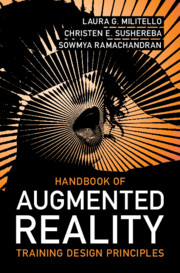Book contents
- Handbook of Augmented Reality Training Design Principles
- Handbook of Augmented Reality Training Design Principles
- Copyright page
- Dedication
- Contents
- Figures
- Tables
- Preface
- Acknowledgments
- Chapter 1 Introduction
- Chapter 2 Recognition Skills
- Chapter 3 Engagement
- Chapter 4 Scenario Building
- Chapter 5 Fidelity and Realism
- Chapter 6 Supporting Mental Model Construction
- Chapter 7 Scaffolding and Reflection
- Chapter 8 Synthesis
- Chapter 9 Conclusion
- References
- Index
Chapter 5 - Fidelity and Realism
Published online by Cambridge University Press: 18 May 2023
- Handbook of Augmented Reality Training Design Principles
- Handbook of Augmented Reality Training Design Principles
- Copyright page
- Dedication
- Contents
- Figures
- Tables
- Preface
- Acknowledgments
- Chapter 1 Introduction
- Chapter 2 Recognition Skills
- Chapter 3 Engagement
- Chapter 4 Scenario Building
- Chapter 5 Fidelity and Realism
- Chapter 6 Supporting Mental Model Construction
- Chapter 7 Scaffolding and Reflection
- Chapter 8 Synthesis
- Chapter 9 Conclusion
- References
- Index
Summary
Augmented reality offers the opportunity to increase the fidelity of training. This chapter describes three principles related to fidelity that augmented reality can effectively support in ways that are difficult for other training modalities. The first, the Sensory Fidelity Principle, describes how realistic cues are needed for perceptual skill development. Training designers often need to make decisions about which cues require high levels of fidelity; domain familiarization activities can help guide these decisions. According to the Scaling Fidelity Principle, virtual props should be represented close to their real-world size. This allows trainees to practice important physical skills, such as body positioning. The Assessment-Action Pairing Principle describes how being able to seamlessly assess a situation and act yields better transfer of training to on-the-job performance than part-task training approaches that separate assessment from acting.
Keywords
- Type
- Chapter
- Information
- Handbook of Augmented Reality Training Design Principles , pp. 50 - 75Publisher: Cambridge University PressPrint publication year: 2023
- 1
- Cited by

